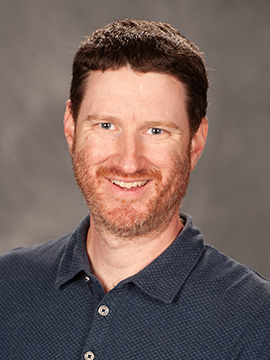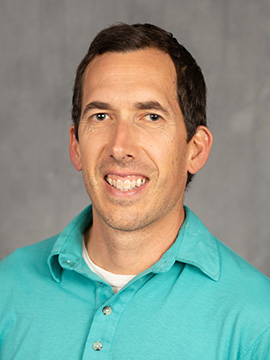Bachelor of Science in engineering degree, mechatronics track
Mechatronics engineering includes the fields of mechanical, electrical and computer engineering with a focus on industrial applications of robots and sensors. Mechatronics engineers solve many practical problems in daily life. Jobs in this expanding field are expected to grow significantly in the next decade. At Hesston College, mechatronics engineering is the focus of our engineering curriculum. Students design mechatronic systems each year in our program.
Success factors
Students who are mathematically inclined with a strong analytical mind and attention to detail make great engineers. These students love to solve problems and come up with creative designs.
Career possibilities
- Robotics engineer/technician
- Automation engineer
- Control system design/troubleshooting engineer
- Electronics design engineer
- Mechanical design engineer
- Data scientist/big data analyst
- Instrumentation engineer
- Software engineer
Accreditation
The baccalaureate degree program in engineering at Hesston College is accredited by the Higher Learning Commission Institutional Action Council. This allows Hesston College to offer a Bachelor of Science in engineering with a mechatronics track, totaling 126 credit hours.
Majoring in mechatronics engineering
- At Hesston College, engineering is greater than just class work. Students learn the design principles necessary to succeed in the field. Students have helped build solar ovens and robots, and improved efficiency of the college.
- Hesston College has well-equipped facilities that support engineering education in a variety of ways. On the software side students have access to Solidworks, Multisim, MATLAB, LabVIEW and Mathematica among others. Our campus is also home to multiple 3D printers and a dynamic robotic workshop.
Engineering curriculum – junior and senior years – course progression flowchart
Plan of Study
First Year Program Courses
Fall Program Courses
- Calculus I
- Intro to Engineering
- Computer Programming I
Recommended Courses
- First-Year Experience
- College Writing I
- Principles of Macroeconomics
Spring Program Courses
- Calculus II
- Physics for Scientists and Engineers I
- Engineering Graphics
- Computer Programming II
Recommended Courses
- Lifetime Fitness and Wellness
Second Year Program Courses
Fall Program Courses
- Calculus III
- Physics for Scientists and Engineers II
- Fundamentals of Mechatronics
Recommended Courses
- Speech Communication
Spring Program Courses
- Differential Equations
- Circuits
- Statics
Recommended Courses
- Biblical Literature
- intercultural competence course
Summer after Second Year
- Engineering Internship
Third Year Program Courses
Fall Program Courses
- Digital System Design
- Electronics
- Dynamics
- General Chemistry I
- Engineering Economics
Spring Program Courses
- Process Control
- Mechatronics System Design
- Intro to Thermal Science
- Manufacturing Methods
Recommended Courses
- humanities course
Fourth Year Program Courses
Fall Program Courses
- Senior Capstone I
- Control Systems
- Design of Machinery
- Engineering Ethics
Recommended Courses
- elective
Spring Program Courses
- Senior Capstone II
- Electrical Power and Machinery
- Solid Mechanics
- Project Management
Catalog 2024-25
Engineering internship summer after sophomore or junior year.
Additional programs associate degree/transfer, click to expand
Engineering
What is engineering?
Engineering is a broad field of study with many specialized focuses including architectural, agricultural, aerospace, biomedical, chemical, civil, computer, electrical, environmental, industrial, mechanical, nuclear and petroleum. Engineers are needed to solve many practical problems in daily life. Engineering is about design in many forms. Hesston College encourages students to design systems that are of interest to them.
Success factors
Students who are mathematically inclined with a strong analytical mind and attention to detail make great engineers. These students love to solve problems and come up with creative designs.
Career possibilities
Mechanical Engineering: research and development, product design, manufacturing, energy, acoustics, vehicle engineering, thermal systems; Civil and Environmental Engineering: road design, transportation, bridge design, water supply systems, surveying, earthquake engineering, wastewater control; Electrical and Computer Engineering: software engineering, hardware engineering, network control; Aerospace Engineering: aeronautics, astronautics; Agriculture Engineering: food engineering, biofuels, systems engineering; Biomedical; Industrial; Nuclear; Mining; Engineering Technology
Majoring in engineering
- At Hesston College, engineering is greater than just class work. Students learn the design principles necessary to succeed in the field. Students have helped build solar ovens and robots, and improved efficiency of the college.
- The Hesston College School of Engineering has well-equipped science laboratories including wireless, computerized data gathering equipment in the physics lab. Computer programs, including Mathematica, allow you to graph and analyze your data electronically and see the data online.
Engineering curriculum
Hesston College’s engineering program prepares you to transfer into a university engineering program of your choice. The recommended pre-engineering program of study can be adjusted for the specific requirements related to specific engineering fields.
Sample curriculum – associate degree in engineering
Engineering Technology
What is engineering technology?
Engineering technology graduates apply their knowledge and practices to the solution of specific technical and standard design problems. All engineering technology programs focus on application and practice with a balance of theory and laboratory experience.
Success factors
In order to successfully compete for technology positions, students should strive to achieve the following twelve practices of excellence.
- Demonstrate high personal standards
- Maintain a positive outlook
- Take personal responsibility for all you do
- Be decisive and persistent
- Demonstrate urgency and a sense of imperative
- Be a team player — cooperate and collaborate
- Ask questions and be curious
- Be service and result oriented
- Pursue self-development and keep learning
- Communicate effectively — verbally and in writing
- Promote new ideas — share your knowledge, time and skills
- Be there every time and on time
Career possibilities
The Hesston College Engineering Technology program provides a common core of knowledge used in these occupations. You will be well prepared to continue on to a four-year degree in any of the following fields/ occupations:
- Research and development
- Product design
- Manufacturing
- Energy
- Acoustics
- Vehicle engineering
- Thermal systems
— Sarah Hostetler, class of 2015, who went on to study chemical engineering at the University of Nebraska-Lincoln
Majoring in engineering technology
- At Hesston College, engineering is greater than just class work. Students learn the design principles necessary to succeed in the field. Students have helped build solar ovens and robots and improved efficiency of the college.
- Hesston College School of Engineering has well-equipped science laboratories including wireless, computerized data gathering equipment in the physics lab. Computer programs, including Mathematica, allow you to graph and analyze your data electronically and see the data online.
Sample curriculum – associate degree in engineering technology
School of Engineering mission, objectives and outcomes
Faculty
Courses
- Engr171 Introduction to Engineering 2 hours
- Engr207 Engineering Graphics 3 hours
- Engr221 Statics 3 hours
- Engr222 Dynamics 3 hours
- Engr231 Circuits 3 hours
- Engr261 Manufacturing Methods 3 hours
- Engr321 Material Selection for Engineering Design 3 hours
- Engr323 Solid Mechanics 4 hours
- Engr331 Digital System Design 3 hours
- Engr333 Process Control 3 hours
- Engr335 Electronics 3 hours
- Engr360 Professional Ethics 3 hours
- Engr363 Project Management 3 hours
- Engr365 Engineering Economics 3 hours
- Engr371 Fundamentals of Mechatronics 3 hours
- Engr372 Mechatronics System Design 3 hours
- Engr422 Design of Machinery 3 hours
- Engr425 Introduction to Thermal Sciences 3 hours
- Engr433 Control Systems 3 hours
- Engr435 Electrical Power and Machinery 3 hours
- Engr471 Mobile Robotics 3 hours
- Engr477 Senior Capstone I 3 hours
- Engr478 Senior Capstone II 3 hours
Goals
The Hesston College School of Engineering educates students on engineering principles and applications, leading to a variety of possibilities for professional growth. These growth opportunities are driven by classroom teaching and lab experiences leading to a Hesston College bachelor’s degree in engineering. Additionally, these growth opportunities can be found in activities like robotics club, summer internships and senior capstone projects.
Facilities
Hesston College has ample lab space for the listed engineering course offerings as well as supporting course work you will need to complete for your engineering degree (physics, chemistry, etc.). Additionally, we have made Solidworks CAD Software available to engineering students. This is the most widely used CAD software in industry, and the access we provide students positions them well for future engineering roles requiring CAD skills. Lastly we have multiple 3D printers that our engineering students have access to in order to be able to rapidly create 3D parts that they are able to initially design using Solidworks.
Alumni
Alumni of the Hesston College engineering program have careers in mechanical, electrical, software and structural engineering as well as many other fields. These alumni have been employed in various industries in Kansas and across the world. Very soon our alumni ranks will also begin to fill out with engineers working in mechatronics as well!



